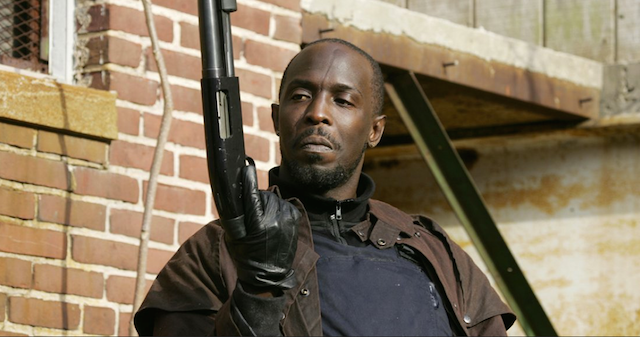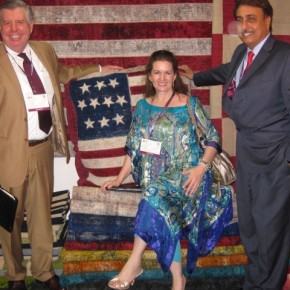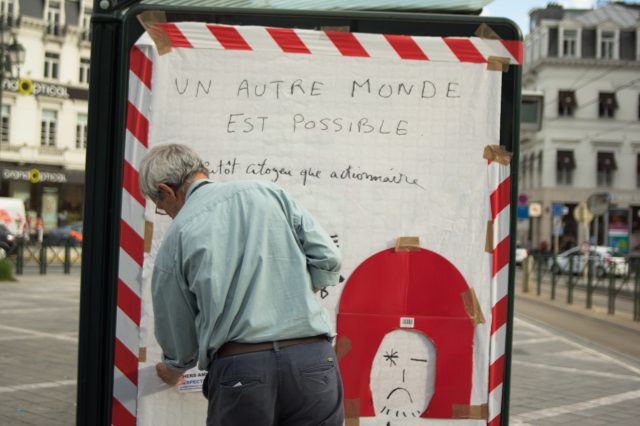The ending of a fiction represents the point at which its essential artificiality is most acute. While individual lives do end, life itself does not end (or at least, will not end on earth for a literally unthinkably long time). When a fiction ends, it is the apotheosis of the human ability and desire to chop up the flow of time into manageably finite stories.
Perhaps it is this intense humanity of fictional endings, together with a sharp awareness of their intrinsic non-humanness, that makes them so compelling. One of the key concepts of the Internet age is the ‘spoiler.’ The spoiler, so easily transmitted through today’s ubiquitous modes of communication, is both an inevitability and something to be feared. In a time when lengthy television dramas have reached peaks of excellence, the spoiler ruins the experience of these fictions. The assumption is that not knowing the ending is essential to enjoying TV drama.
A pattern has now been set: when a long-running drama approaches its end, speculation of what the end will consist of starts to build, creating a buzz that reaches fever pitch on the long-anticipated final night of the final series. The Wire, The Sopranos Breaking Bad and, most recently, Mad Men, have all generated enormous interest leading up to the final episode, followed by intense discussions of how appropriate and satisfying the ending was.
In the case of Game of Thrones, speculation about the ending of the show has started to build despite there being no official announcement of the number of series that will be made, and no release yet for the (possibly final) book in the George RR Martin series.
Part of the reason for the speculation is simple: both the books and the TV programme are incredibly compelling, exciting and involving. But I think there is more to it than just this. The ending of Game Of Thrones is such a serious and important matter to fans because any ending to the series or the books will inevitably clash in fundamental ways with its essence. That essence, I want to argue, is, despite Game Of Thrones being set in an entirely fictional universe, profoundly sociological. To end Game Of Thrones would be to jeopardise the very basis of its distinctive social science fiction.
To some extent, of course, all fiction is social science fiction, in the sense that it refracts and manipulates an understanding of the possibilities and constraints of human society. To the extent that human interaction is grounded on an implicit understanding of what society is, we are all sociologists to some extent. But what I mean here by Game Of Thrones being profoundly sociological, is that it displays the more intense and systematic forms of social scientific thinking that sociology as a discipline has pioneered. Not that this is a conscious aim of Martin or the producers and writers of the TV series, but that there is a synergy between the structure of Game Of Thrones and some of the themes explored in sociological thinking.
The TV series that is most commonly thought of as sociological is, of course, The Wire. It’s not hard to see why: the programme combined quasi-ethnographic engagement with the various strata of Baltimore life and offered a devastating analysis of how racism, poverty, crime and corruption are produced within the contemporary post-industrial American city.
The ending of The Wire was the series at its most sociological [spoiler ahead]. Although it appears that much has happened in the five series, the closing montage makes the point that nothing has changed: Omar may be dead, but Michael takes his place; Bubbles is replaced by Dukie; the politicians, judges and prosecuters shuffle their places; the street remains the street, the school remains the school, etc etc. This is as explicit an appreciation of the power of social structure as you are ever likely to find in TV drama. It mirrors those sociological theories that are more pessimistic about the power of human agency, and that emphasise the constraining power of structure.
Yet there are other ways of understanding the eternal sociological preoccupation with the relative power of structure and agency. In this respect, other recent acclaimed TV dramas also show an intense sociological awareness – but are much less likely to be recognized as such than The Wire.
Take Breaking Bad. The focus here is less on understanding the entire sociological ecosystem of Albuquerque – although there is a certain amount of this – than it is on understanding the trajectory of one particular man, Walter White, and to a lesser extent his friends, enemies, colleagues and family. The Wire has a number of main characters; Breaking Bad is much more tightly (and, seemingly, conventionally) focused on a star and a few supporting characters.
If The Wire focuses on structure, Breaking Bad focuses on agency. But the latter is in no way a celebration of the power of the individual, so much as the individual’s limitations. The ending of the show reflects this [spoilers]: Whereas The Wire ends with everything the same, Breaking Bad ends with the (presumed) death of the main character. Walter White manages to strike back against his enemies, to do some limited good with his money and to finally admit the pleasure he took in cooking meth; he remains a failure in his other goals to survive cancer and to provide a better life for his family. Throughout the series, Breaking Bad highlights White’s incredible resourcefulness and his repeated ability to get out of jams, but counterpoises this to his inability to remain in control of his overall trajectory.
This is a profoundly sociological narrative. Almost from its inception, sociology has shown how, to quote Marx, ‘men make their own history, but they do not make it as they please.’ Max Weber’s Protestant Ethic and The Spirit of Capitalism remains the defining demonstration of this. Weber shows that what starts out as a Calvinist desire to convince oneself of one’s chosenness by God, turns into the entirely unanticipated genesis of the capitalist mode of production. Humans can and do exercise agency, and at the same time their ability to remake the world is limited not only by structural constraints, but by the sheer unpredictability and the complexity of the outcomes of action.
Breaking Bad provides an implicitly sociological critique of contemporary neoliberal society every bit as devastating as The Wire’s. While there are areas where the programme highlights structural features in a Wire-like way – the limitations of the US healthcare system for example – what is much more striking is Breaking Bad’s undermining of myths of America’s ability to provide a space for self-creation. Walter White would seem to have followed (albeit illegally) the American dream in its most Randian form, but his dreams turn to dust as he comes up against the reality that no one is able to escape the constraining power of unintended consequences. In an America ever more in thrall to fantasies of unlimited individual potential, this is a highly subversive – and highly sociological – message.
And so we come back to Game Of Thrones. Like Breaking Bad and The Wire, the show offers a savage takedown of the power of human agency. Characters repeatedly embark on courses of action that either result in total failure or fleeting success followed by entirely unanticipated consequences. [spoilers] The execution of Ned Stark early in the series is Game Of Thrones’ brutal warning to viewers/readers: there will be no heroes, there will be no certain redemption, there is no guarantee that things will be all right in the end. Repeatedly, characters embark on physical journeys that are either protracted indefinitely (as with Arya Stark) or that end up in an entirely unexpected place (as with Catelyn Stark). You are never sure whether a character, such as Littlefinger, who seems like they have a plan, actually has a plan or is simply improvising indefinitely. Westeros may not be earth, but its humans are as susceptible to unintended consequences as we on earth are.
Like The Wire, Game Of Thrones also displays a profound appreciation of the crushing power of structure. Not only are the constraints of the physical environment – above all, the planet’s unpredictable weather – overwhelming and terrifying, there seems to be no way for anyone to enact a fundamental change in the political and social system. Daenerys Targaryen may evince a desire to ‘break the wheel’ as she puts it, but in the long term the system reacts forcefully against her and her ability to withstand this reaction is uncertain. This is an old society that has existed for thousands of years without apparent technological progress or social change beyond the replacement of dynasties with other dynasties. The world of Game Of Thrones is depicted as structurally ‘stuck’, just like Baltimore appears to be in The Wire’s closing montage.
Game Of Thrones, therefore, represents a sociological critique of neo-liberal paeans to individual potency, just as The Wire and Breaking Bad do. Unlike the latter two programmes though, the end of the series has not yet been reached, so it remains an open question whether Game Of Thrones will preserve this subversive vision.
The question of how to end Game Of Thrones is a problem whose implications go way beyond the merely technical or narrative. To end the series would be to risk jeopardising its vision of a world where nothing can fundamentally change. Of course, there are ways round this problem: Game Of Thrones could end when its central characters either die or end up with some kind of temporary stability; it could end when non-human characters, like the White Walkers, prevail over the human; it could end with a winter so severe that human life becomes unviable; it could also end with a strong leader prevails over the rest, enforcing a new equilibrium.
All of these possible endings may or may not be achievable and dramatically satisfying. But none of them will be truly sociologically satisfying. Here we come back to the essential problem with fictional endings – that they are both necessary and ultimately highlight the fact that they are fictions. Social science fiction can penetrate sociological truths with a power that academic writing can never match. But its narrative pleasures may in the end blunt their ability to represent the limitations and possibilities of human existence.
Omar Little photograph courtesy of David Simon/The Wire.





